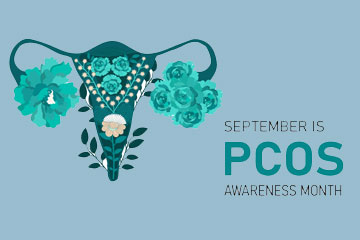
A common cause of female infertility, polycystic ovary syndrome (PCOS) is a condition that affects a woman’s hormone levels. September is observed as “National Polycystic Ovary Syndrome Month” in the United States. Sponsored by the National Polycystic Ovary Syndrome Association, the 2022 awareness campaign draws attention to the plight of women dealing with PCOS. The campaign is focused on improving the lives of women affected by PCOS and helping them to overcome their symptoms as well as reducing their risks for related life-threatening diseases such as diabetes, cardiovascular disease, nonalcoholic fatty liver disease and cancer.
Per recent reports, PCOS affects about 5-7 million women in the United States. The condition affects women during their childbearing years (ages between 15-44 years). The hormonal condition occurs when the ovaries develop numerous small collections of fluid (follicles) and fail to regularly release eggs. Women with this condition may produce higher-than-normal amounts of male hormone (androgen) levels. The exact cause of PCOS is not known. However, several factors like – excess insulin, low- grade inflammation and excess androgen may play an active role.
Many women who have PCOS don’t know about it. The 2022 campaign urges medical researchers and healthcare professionals to advance their understanding of PCOS in order to research, diagnose, and provide assistance to women with this condition. Symptoms start during the early or first menstrual period. In certain other cases, women with PCOS tend to gain considerable amount of weight or experience trouble getting pregnant. Other signs and symptoms include – irregular menstrual periods, high levels of androgen and many small cysts on the ovaries. There is no single test to specifically diagnose PCOS. Diagnosis may begin with a detailed analysis of symptoms and other medical conditions. Diagnosis tests include – pelvic exam, blood tests and ultrasound (to check the appearance and the thickness of the lining of uterus).Treatment involves a combination of medications and lifestyle changes like reducing body weight, limiting the intake of carbohydrates, and leading an active lifestyle.
Experts believe that PCOS is primarily caused by a sedentary lifestyle. Being physically inactive, improper sleeping patterns, high stress levels and smoking are some of the common reasons for hormonal imbalances and increased risks of developing the condition. Here are five strategies that could help prevent or reduce the risk of developing PCOS –
- Maintain a Healthy Body Weight – Staying at a healthy weight is an important way to prevent PCOS. Weight loss can lower insulin and androgen levels and may also restore ovulation. Dieticians can design programs focused on the prevention of unwanted weight gain from excess body fat.
- Follow a Balanced Diet – A balanced diet with all foods groups is important. Patients need to eat healthy and in moderate quantities. Avoid processed food items. Eat a healthy diet consisting of fruit, vegetables, lean proteins and whole grains. This can help reduce your risk of developing PCOS in the long run.
- Quit Smoking – Smoking increases the risk of PCOS. It also damages nearly every organ and organ system in the body. Quitting reduces PCOS risk, even if you’ve smoked for years.
- Stay Physically Active – Exercise helps reduce blood sugar levels. If you have PCOS, increasing your daily activity and getting regular exercise may treat or even prevent insulin resistance. This can also keep your weight under control and help prevent diabetes.
- Recognize the Warning Symptoms – As stated above, most women with PCOS do not know about it. In most cases, symptoms appear around the time of the first period. Therefore, it is important to important to recognize the warning signs and learn if there are things you can do to reduce your risk. Consult a gynecologist if you notice warning signs.
During the annual PCOS awareness campaign, a wide range of programs and events are organized to educate the public about the condition. In its tenth year, the PCOS Awareness Symposium presented by PCOS Challenge: The National Polycystic Ovary Syndrome Association brings together clinicians, researchers, patients and their supporters to share their experiences, insights and the latest updates about the condition.